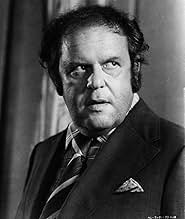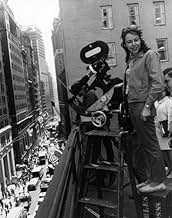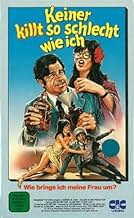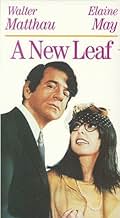IMDb रेटिंग
7.3/10
8.3 हज़ार
आपकी रेटिंग
अपनी भाषा में प्लॉट जोड़ेंWhen Henry Graham's lawyer informs him that his playboy lifestyle has consumed all of his funds, he must avoid sliding down the social ladder. He plans to marry wealthy scientist Henrietta L... सभी पढ़ेंWhen Henry Graham's lawyer informs him that his playboy lifestyle has consumed all of his funds, he must avoid sliding down the social ladder. He plans to marry wealthy scientist Henrietta Lowell--and kill her.When Henry Graham's lawyer informs him that his playboy lifestyle has consumed all of his funds, he must avoid sliding down the social ladder. He plans to marry wealthy scientist Henrietta Lowell--and kill her.
- पुरस्कार
- 1 जीत और कुल 3 नामांकन
Conrad Bain
- Professor Heinrich
- (बिना क्रेडिट के)
Ida Berlin
- Maid
- (बिना क्रेडिट के)
Mildred Clinton
- Mrs. Heinrich
- (बिना क्रेडिट के)
Trent Gough
- Victor the Butler
- (बिना क्रेडिट के)
फ़ीचर्ड समीक्षाएं
There is a category of films that includes several movies made by serious artists which emerged in a final form much different from that originally conceived. This group includes Erich Von Stroheim's silent masterpiece "Greed"------originally made as a movie that ran for over nine hours!; John Huston's filming of Stephen Crane's "Red Badge of Courage"-----finally presented to us by M-G-M in a badly mutilated 69 minute fragment of its original form; Orson Welles' conception of Booth Tarkington's "Magnificent Ambersons"---taken away from him by RKO bureaucrats who then edited it down to a truncated 88 minutes; and Frank Capra's "Lost Horizon"---originally released at 130 minutes in length and then chopped down to 109 minutes in subsequent re-releases.
We will never know what these works would have ended up looking like. Even in a recent attempt to "restore" "Greed" to something approximating its original form, the missing links are supplied through available studio "still" photos. Such travesties have been going on for years. Judy Garland's much admired version of "A Star Is Born" can now be seen only in a "restored" version that follows a fate somewhat similar to that of "Greed." The same is true of "Lost Horizon." Nonetheless, we should be grateful that a portion of these films did survive, to give us the pleasure of seeing something very special---even if only in a limited sense,
This takes us to "A New Leaf." As most film goers know, Elaine May wrote a significantly different (and much darker) screenplay than the movie we now see on the screen. But to her credit, the film she made had so many elements of true greatness in it that the studio edited version now available is very enjoyable on its own terms. It is one of the most underrated comedies of the 1970's and surely one of the funniest and most inspired.
The ensemble of actors May gathered created some superb comic characters---and have never done any better work in comedy. May and Walter Matthau's chemistry in the leading roles worked exceptionally well. William Redfield (who died much too young) is wonderful in a carefully understated role. And singled out for special recognition is George Rose as Matthau's long-suffering valet---a nuanced presentation by a very gifted actor.
Matthau's romance of May is sweet, touching, at times somewhat edgy and always engaging. The growth of their relationship from an almost bloodless union of convenience to the quite tender match up at the end is but one example of the high level of May's comedic writing and the very capable acting of May and Matthau. Too bad that they never had the opportunity to appear together again.
"A New Leaf" deserves both a wider audience, and repeated viewings to appreciate just what a great film it really is. As others have noted, it also demands a good DVD presentation for that whole new generation of lovers of fine comedy who have never seen it before.
Can anyone watch Renee Taylor in her one great scene with Matthau uttering the line "Don't let them out!" possibly ever forget this movie?
Finally---a personal appeal to Elaine May. Some day (soon we hope), "A New Leaf" will be released to DVD in an edition worthy of the film so many people have come to admire. You will no doubt be asked to supply the DVD with an audio commentary on the film. It is essential----really critical----that your views on the making of this film be preserved for present and future generations. Almost 40 years have passed since its original release. Tell us your story!
We will never know what these works would have ended up looking like. Even in a recent attempt to "restore" "Greed" to something approximating its original form, the missing links are supplied through available studio "still" photos. Such travesties have been going on for years. Judy Garland's much admired version of "A Star Is Born" can now be seen only in a "restored" version that follows a fate somewhat similar to that of "Greed." The same is true of "Lost Horizon." Nonetheless, we should be grateful that a portion of these films did survive, to give us the pleasure of seeing something very special---even if only in a limited sense,
This takes us to "A New Leaf." As most film goers know, Elaine May wrote a significantly different (and much darker) screenplay than the movie we now see on the screen. But to her credit, the film she made had so many elements of true greatness in it that the studio edited version now available is very enjoyable on its own terms. It is one of the most underrated comedies of the 1970's and surely one of the funniest and most inspired.
The ensemble of actors May gathered created some superb comic characters---and have never done any better work in comedy. May and Walter Matthau's chemistry in the leading roles worked exceptionally well. William Redfield (who died much too young) is wonderful in a carefully understated role. And singled out for special recognition is George Rose as Matthau's long-suffering valet---a nuanced presentation by a very gifted actor.
Matthau's romance of May is sweet, touching, at times somewhat edgy and always engaging. The growth of their relationship from an almost bloodless union of convenience to the quite tender match up at the end is but one example of the high level of May's comedic writing and the very capable acting of May and Matthau. Too bad that they never had the opportunity to appear together again.
"A New Leaf" deserves both a wider audience, and repeated viewings to appreciate just what a great film it really is. As others have noted, it also demands a good DVD presentation for that whole new generation of lovers of fine comedy who have never seen it before.
Can anyone watch Renee Taylor in her one great scene with Matthau uttering the line "Don't let them out!" possibly ever forget this movie?
Finally---a personal appeal to Elaine May. Some day (soon we hope), "A New Leaf" will be released to DVD in an edition worthy of the film so many people have come to admire. You will no doubt be asked to supply the DVD with an audio commentary on the film. It is essential----really critical----that your views on the making of this film be preserved for present and future generations. Almost 40 years have passed since its original release. Tell us your story!
A New Leaf (1971)
A kookie, forcibly odd movie. If at first you think it's just plain stupid, keep watching. It's really well balanced, smartly written, and acted with more restraint than usual for a madcap movie like this.
It's billed (by some) as filled with dark humor, but it didn't strike me as dark, not like the contemporary "Harold and Maude" for example. But there is an unusual tone achieved here that is just slightly different and worth getting a feel for. There is, for another example, a parallel in general plot and scenario to "How to Murder Your Wife" from 1965, complete with the willing butler and the hapless rich bachelor, but that movie is a silly 1960s farce and this one has an edge of almost poignancy to it. (I write that word and think Elaine May would cringe--only because I don't think there is an intention to be sentimental or even romantic, the last scene notwithstanding.)
The star is singularly Walter Matthau, who is almost necessarily goofy just by appearances. But maybe the first clever trick by the director, Elaine May, is putting the goofy man in even goofier situations so that he comes off as actually someone serious and believable. To have his character, Henry Graham, driving in his red Ferrari wearing a crash helmet is pure insanity, yet you don't blink an eye. The guy is self-absorbed and nuts. But also very likable, a little out of touch the way we all are, or wish we could be (if we had his money).
And of course the man's dilemma is stated immediately: the money he once had so much of is used up. And you have to see to appreciate the one long scene in the first twenty minutes with Graham meeting his financial adviser about some bounced checks. This is comedy at its absolute best--I mean that. Watch only this scene if you must (and I dare you to skip the rest of the movie once you do). The actor opposite Matthau here is William Redfield, who pulls off the most brilliant of performances.
The other leading character, eventually, is Elaine May herself as the clumsy, naive, filthy rich scientist who Graham sets his sights on for salvation. She is terrific, as well, and like Woody Allen of the same time ("Bananas" is also 1971) seems to direct her own comic zaniness with a calculated distance. The rest of the shenanigans play out with the necessary twists, and it's consistently funny.
So, see this for its freshness even four decades later. No wonder it has a (small but growing) cult following. May has suffered historically from having made the bizarrely awkward "Ishtar" and for being forever linked in the early 1960s as the comedy partner of Mike Nichols, whose movie career overshadows almost everyone's. But here, at least, she shines on her own terms, without distraction.
A kookie, forcibly odd movie. If at first you think it's just plain stupid, keep watching. It's really well balanced, smartly written, and acted with more restraint than usual for a madcap movie like this.
It's billed (by some) as filled with dark humor, but it didn't strike me as dark, not like the contemporary "Harold and Maude" for example. But there is an unusual tone achieved here that is just slightly different and worth getting a feel for. There is, for another example, a parallel in general plot and scenario to "How to Murder Your Wife" from 1965, complete with the willing butler and the hapless rich bachelor, but that movie is a silly 1960s farce and this one has an edge of almost poignancy to it. (I write that word and think Elaine May would cringe--only because I don't think there is an intention to be sentimental or even romantic, the last scene notwithstanding.)
The star is singularly Walter Matthau, who is almost necessarily goofy just by appearances. But maybe the first clever trick by the director, Elaine May, is putting the goofy man in even goofier situations so that he comes off as actually someone serious and believable. To have his character, Henry Graham, driving in his red Ferrari wearing a crash helmet is pure insanity, yet you don't blink an eye. The guy is self-absorbed and nuts. But also very likable, a little out of touch the way we all are, or wish we could be (if we had his money).
And of course the man's dilemma is stated immediately: the money he once had so much of is used up. And you have to see to appreciate the one long scene in the first twenty minutes with Graham meeting his financial adviser about some bounced checks. This is comedy at its absolute best--I mean that. Watch only this scene if you must (and I dare you to skip the rest of the movie once you do). The actor opposite Matthau here is William Redfield, who pulls off the most brilliant of performances.
The other leading character, eventually, is Elaine May herself as the clumsy, naive, filthy rich scientist who Graham sets his sights on for salvation. She is terrific, as well, and like Woody Allen of the same time ("Bananas" is also 1971) seems to direct her own comic zaniness with a calculated distance. The rest of the shenanigans play out with the necessary twists, and it's consistently funny.
So, see this for its freshness even four decades later. No wonder it has a (small but growing) cult following. May has suffered historically from having made the bizarrely awkward "Ishtar" and for being forever linked in the early 1960s as the comedy partner of Mike Nichols, whose movie career overshadows almost everyone's. But here, at least, she shines on her own terms, without distraction.
My room mate and I love this film. We're always quoting lines from it.
"There's carbon on the valves!"
"I've achieved a sort of immortality. As a footnote and under G."
"Henrietta, you have your head in the arm hole!"
I respect Ms. May so much I feel a little guilty enjoying the film she disowned. I hope one day she will, if possible, do a "Touch Of Evil" style re-editing of the film, so that we can enjoy it as she originally intended. I guess you could say that this is my hope and my dream, which is to say that my hope and my dream are the same (my dream.)
"There's carbon on the valves!"
"I've achieved a sort of immortality. As a footnote and under G."
"Henrietta, you have your head in the arm hole!"
I respect Ms. May so much I feel a little guilty enjoying the film she disowned. I hope one day she will, if possible, do a "Touch Of Evil" style re-editing of the film, so that we can enjoy it as she originally intended. I guess you could say that this is my hope and my dream, which is to say that my hope and my dream are the same (my dream.)
Elaine May has created a many layered comedy that stays with you, if you can connect with it. The paths ones life takes often has many bends. Henry (Matthau) has no idea how many. Born to a life style he can not maintain, he chooses to deal with adversity by ignoring it. Eventually reality shakes him loose, and he must learn to deal with things and give back to society rather than taking from it. Henrietta (May) is his victim and his savior. The epitome of a child who was always sent away, she has grown into a person who is not really there. Her catalyst and transmogrifier is Henry. Haunting dialog and poignant social exposition make this classic 70's sleeper worth every stretch.
Every now and then you stumble across a film that has been forgotten, or just ignored, and for the life of you, you can't figure out why. "A New Leaf" is such a film. Seeing this wonderful comedy for the first time was the movie-watching equivalent of discovering buried treasure.
One of the marks of an excellent comedy is one that you can watch a number of times and still laugh involuntarily even though you know what is coming. The performances of Matthau and May, as well as the supporting cast are that priceless.
So many funny and memorable scenes, but a couple of my favorites are: the meeting between Henry Graham (Matthau) and his accountant Beckett (Redfield) as Beckett tries to contain his frustration and explain to Matthau that his money is gone ("perfect"); and the scene where Graham crawls to his rich uncle (James Coco) to ask to borrow money while the uncle is favoring an electric pepper mill during his lavish meal (the expressions on Matthau's face are exquisite).
A delightful, black romantic comedy that somehow manages to be very light, and as a bonus even subtly tosses out some profound truths.
One of the marks of an excellent comedy is one that you can watch a number of times and still laugh involuntarily even though you know what is coming. The performances of Matthau and May, as well as the supporting cast are that priceless.
So many funny and memorable scenes, but a couple of my favorites are: the meeting between Henry Graham (Matthau) and his accountant Beckett (Redfield) as Beckett tries to contain his frustration and explain to Matthau that his money is gone ("perfect"); and the scene where Graham crawls to his rich uncle (James Coco) to ask to borrow money while the uncle is favoring an electric pepper mill during his lavish meal (the expressions on Matthau's face are exquisite).
A delightful, black romantic comedy that somehow manages to be very light, and as a bonus even subtly tosses out some profound truths.
क्या आपको पता है
- ट्रिवियाThe film as delivered by Elaine May was drastically re-cut and shortened ("butchered", according to some) by Paramount before its release. May sued Paramount after such drastic cuts and attempted to have her name removed from the credits, but was unsuccessful. Sadly, neither the director's cut of the film nor the original shooting script has ever been made publicly available.
- भाव
Henry Graham: Excuse me, you're not by any chance related to the Boston Hitlers?
- कनेक्शनFeatured in Siskel & Ebert & the Movies: Buried Treasures - 1987 Edition (1987)
टॉप पसंद
रेटिंग देने के लिए साइन-इन करें और वैयक्तिकृत सुझावों के लिए वॉचलिस्ट करें
- How long is A New Leaf?Alexa द्वारा संचालित
- I recognized some of the pictures in Henry's collection but who painted the rest of them?
विवरण
- रिलीज़ की तारीख़
- कंट्री ऑफ़ ओरिजिन
- भाषाएं
- इस रूप में भी जाना जाता है
- The Green Heart
- फ़िल्माने की जगहें
- Oakland Gardens, क्वींस, न्यूयॉर्क शहर, न्यूयॉर्क, संयुक्त राज्य अमेरिका(Henry drives his Ferrari from the southbound Cross Island Parkway to the eastbound Long Island Expressway)
- उत्पादन कंपनियां
- IMDbPro पर और कंपनी क्रेडिट देखें
बॉक्स ऑफ़िस
- बजट
- $40,00,000(अनुमानित)
- दुनिया भर में सकल
- $308
इस पेज में योगदान दें
किसी बदलाव का सुझाव दें या अनुपलब्ध कॉन्टेंट जोड़ें
























